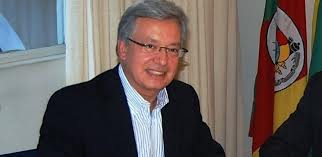By Paul Nicholson
May 21 – With 25 days to go to the opening match of the Confederations Cup in Brasilia between Brazil and Japan there is a sense that the people are ready, even if the infrastructure might not be, yet.
Marcelo Campos Pinto, executive director of Globo Sports, the key local broadcast stakeholder for the Confederations and World Cups, has had a hectic three weeks, in Zurich, completing mobile rights contracts and then back in Brazil with the recent visits of FIFA.
“We are a bit concerned that many of the Confederations Cup stadia have not been properly tested. I have no problem with the people handling the matches, but the communications could still be a problem,” said Pinto. And what if there really is a problem with the engineering and the fibre optics don’t quite live up to their billing? “There is a back-up plan. Satellites are reserved as back-up. there will be no problem.”
Brazil has come a long way in a short space of time after a much publicised slower start than FIFA had wanted. If everything isn’t working perfectly for the Confederations Cup then “for the World Cup everything will be in place”, he says.
Pinto paints a picture of country that is bursting with excitement and enthusiasm to get the party started. So what if the preparations aren’t quite perfect yet, they will be ready for the big show and the warm-up is going to be one hell of a party in any case.
Behind the enthusiasm there is also a clear understanding of how this ‘party’ needs to be managed, and where it is taking this fanatical football nation.
Pinto will be a panelist at the FT/IFA conference at the Copacabana Palace, Rio de Janeiro, June 17. By then the Confederations Cup will be two days old, Brazil will have opened the tournament, and the day before Pinto sits down on his panel, the iconic Maracana stadium will have hosted Italy vs Mexico. The party will be in full swing.
The panel Pinto is on is titled ‘Fields of Gold: Where is the new growth in the football market?’ In Brazil those fields of gold are being harvested now. In terms of the advertising market, “next year is going to be the year. We never will have a year like this and we never had it in the past.”
The TV advertising market is strong and growing at about 9% this year – it will be considerably more in World Cup year. “Next year we are going to make money,” says Pinto with a smile you can see at the other end of the phone from Europe.
In 2002 Globo lost money on the World Cup, in 2006 it made a slight profit ($10 million), in 2010 it made $25 million. 2014 will eclipse that, and it will have been worth waiting for. Pinto did not put a figure on the amount the broadcaster expects to make.
Having the broadcast rights to premium football comes at a cost and Pinto feels that clubs in Brazil are already at their peak in terms of the money that can be earned from the domestic TV rights market. The last deal for Brazil’s SerieA to 2015 was a 100% increase on the previous deal, and for the deal to 2018 the increase is another 60%.
Other competitions like the Copa America and the Copa Libertadores have had similar increases. But where one tournament wins, others lose out – the state championships (the traditional leagues that were played before the formation of SerieA 15 years ago) will likely find their TV revenue going down 30 to 35%, according to Pinto.
For Pinto, football in Brazil will have to look in places other than the broadcast market to find the next revenue growth areas.
Those places do exist and the World Cup is facilitating them. “Clubs need to look at their own operations and especially at match day income,” says Pinto. “In Brazil we had stadia built in the 50s and 60s. After the World Cup we will effectively have 15 new state of the art stadia. This will change the public perception and the opportunity for new income from premium seats, corporate boxes, food and beverage, parking concessions. In Brazil only 9% of club income comes from match day.”
But he also cautions high spending clubs though. “In Brazil we need a financial fair play. Clubs must balance their income and expenses.”
If that was the message from the high paying broadcaster to the clubs, he also has a message to the leagues and federations that he hopes will be communicated at the June 17 conference. “It would be good for the audience to hear how important it is for the organisers of competitions to preserve the rights of the rightsholders as this enhances the value for the stakeholders. It enhances value for everyone.”
Marcelo Pinto will be speaking at the FT/IFA Business of Football Summit, June 17 at the Copacabana Palace, Rio de Janeiro. IFA conferences are by invitation. To register interest and for more information go to www.ft-live.com/football. Insideworldfootball is a media partner of IFA.
Contact the writer of this story at moc.l1745666295labto1745666295ofdlr1745666295owedi1745666295sni@n1745666295osloh1745666295cin.l1745666295uap1745666295

